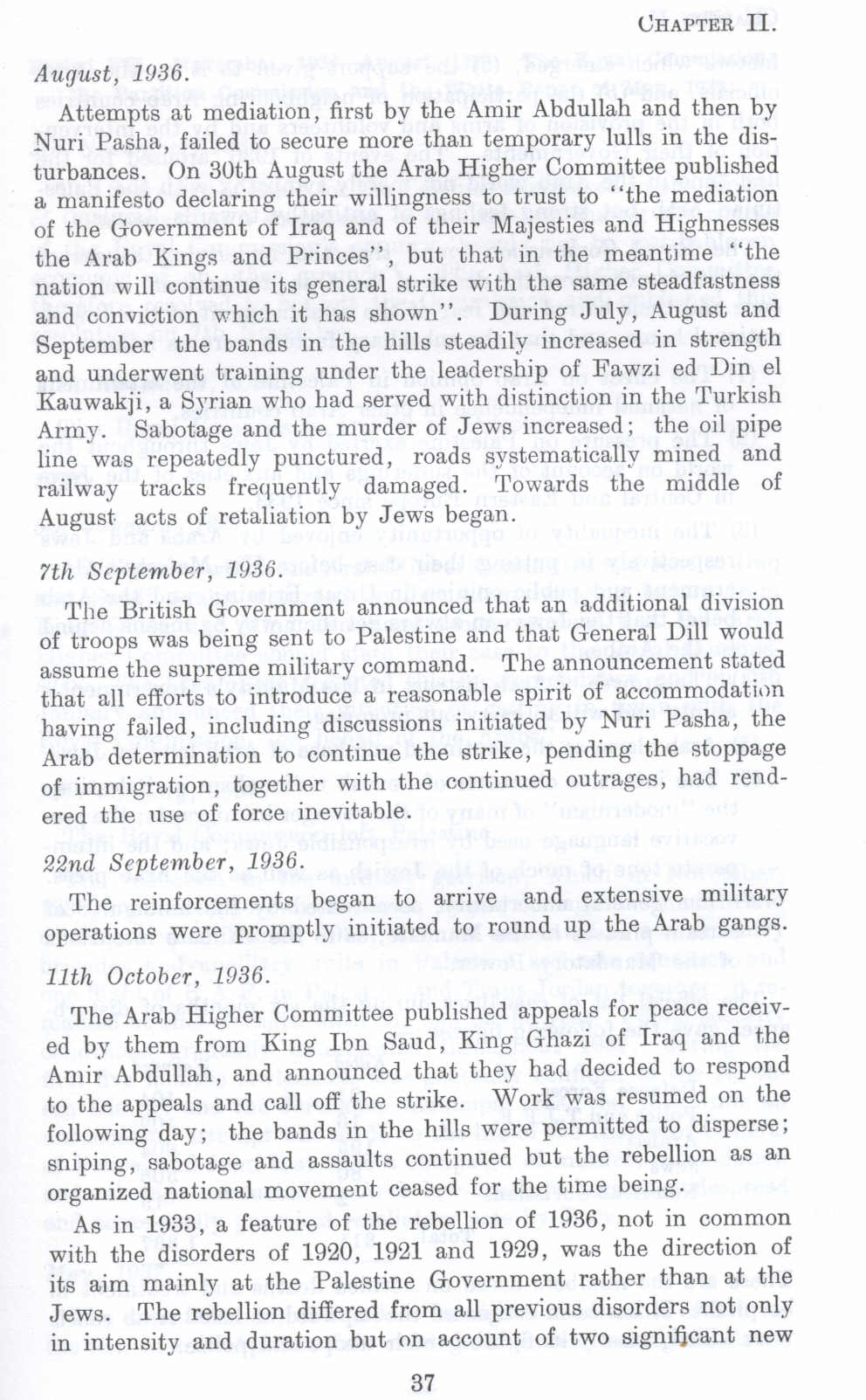| Prev | Next |  |
| Prev | Next |
| PalestineRemembered | About Us | Oral History | العربية | |
| Pictures | Zionist FAQs | Haavara | Maps | |
| Search |
| Camps |
| Districts |
| Acre |
| Baysan |
| Beersheba |
| Bethlehem |
| Gaza |
| Haifa |
| Hebron |
| Jaffa |
| Jericho |
| Jerusalem |
| Jinin |
| Nablus |
| Nazareth |
| Ramallah |
| al-Ramla |
| Safad |
| Tiberias |
| Tulkarm |
| Donate |
| Contact |
| Profile |
| Videos |
British Mandate: A Survey of Palestine: Historical summary, August-October 1936. Period VI: The disorder of 1936 Volume I - Page 37 |
Disclaimer
The above documents, article, interviews, movies, podcasts, or stories reflects solely the research and opinions of its authors. PalestineRemembered.com makes its best effort to validate its contents.


Post Your Comment
*It should be NOTED that your email address won't be shared, and all communications between members will be routed via the website's mail server.
August, 1936.
Attempts at mediation, first by the Amir Abdullah and then by Nuri Pasha, failed to secure more than temporary lulls in the disturbances. On 30th August the Arab Higher Committee published a manifesto declaring their willingness to trust to "the mediation of the Government of Iraq and of their Majesties and Highnesses the Arab Kings and Princes", but that in the meantime "the nation will continue its general strike with the same steadfastness and conviction which it has shown". During July, August and September the bands in the bills steadily increased in strength and underwent training under the leadership of Fawzi ed Din el Kauwakji, a Syrian who bad served with distinction in the Turkish Army. Sabotage and the murder of Jews increased; the oil pipe line was repeatedly punctured, roads systematically mined and railway tracks frequently damaged. Towards the middle of August acts of retaliation by Jews began.
7th September, 1936.
The British Government announced that an additional division of troops was being sent to Palestine and that General Dill would assume the supreme military command. The announcement stated that all efforts to introduce a reasonable spirit of accommodation having failed, including discussions initiated by Nuri Pasha, the Arab determination to continue the strike, pending the stoppage of immigration, together with the continued outrages, had rendered the use of force inevitable.
22nd September, 1936.
The reinforcements began to arrive and extensive military operations were promptly initiated to round up the Arab gangs.
11th October, 1936.
The Arab Higher Committee published appeals for peace received by them from King Ibn Saud, King Ghazi of Iraq and the Amir Abdullah, and announced that they bad decided to respond to the appeals and call off the strike. Work was resumed on the following day; the bands in the hills were permitted to disperse; sniping, sabotage and assaults continued but the rebellion as an organized national movement ceased for the time being.
As in 1933, a feature of the rebellion of 1936, not in common with the disorders of 1920, 1921 and 1929, was the direction of its aim mainly at the Palestine Government rather than at the Jews. The rebellion differed from all previous disorders not only in intensity and duration but on account of two significant new
Page 37